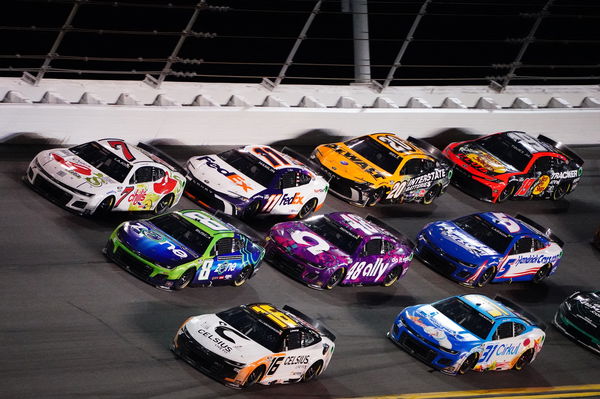Jeff Gordon’s Former Crew Chief Opened NASCAR’s Eyes to the Importance of Race Engineers

Follow Us

USA Today via Reuters
Feb 19, 2024; Daytona Beach, Florida, USA; NASCAR Cup Series driver AJ Allmendinger (16), driver Kyle Busch (8) and driver Corey LaJoie (7) race three wide during the Daytona 500 at Daytona International Speedway. Mandatory Credit: John David Mercer-USA TODAY Sports
Imagine an era without a race car engineer in motorsports. You can’t, right? But there was a time when NASCAR’s winningest team had none, while the Ford team did. Again, that’s unbelievable! In the high-speed world of NASCAR, where the presence of race engineers is crucial, there was a time when teams managed without them. Today, an engineer’s primary tasks include assessing the vehicle’s performance, collecting data from telemetry (sensors on the car), and providing the drivers with feedback.
With performance data, race engineers strive to boost the car’s performance to align with the driver’s preferences. And often they are heard voicing their opinions and changing the big views for the sport. One such legendary race engineer is Ray Evernham.
Evernham, being one of the crucial figures in NASCAR, has seen it all, revolutionized race engineering, and significantly influenced the sport. He began as a modified racer, gaining valuable insights from his track experience. Ray Evernham, along with Jeff Gordon, briefly collaborated in 1990 and won 47 Cup races, 3 Cup championships (1995, 1997, and 1998) making them the dominant team in NASCAR Cup competition at the time. But how did the race engineer journey start for HMS? Let’s find out.
Ray Evernham’s transformative vision significantly reshaped the HMS garage
Recently, Ray Evernham opened up to Kevin Harvick on an episode of “Kevin Harvick’s Happy Hour” regarding various aspects of NASCAR, imparting his extensive racing wisdom and providing guidance and advice for budding drivers and car enthusiasts. Evernham talks of how engineering, an engineer’s role, and development underwent back in the day, and how they are today. When Harvick asked if there were enough “engineers” back in the day on the staff, this is what Evernham said, “It was obviously, we had some of that. But Brian Whitesell who’s still there you know.”
Further providing insights on how Hendrick’s camp was unaware of engineers, and Penske were, he added, “Jimmie Johnson like you can’t have an engineer. You show me how an engineer’s gonna make that car go faster? And I was like yeah, you know because I’d come from Penske. Yeah, you know, that but they knew about the engineering stuff. And so, he said, if you hire an engineer, you know that’s gonna put you one guy over.”
Giving away the fact that HMS technically had an engineer, who also drove in the Truck Series, he said, “So Brian Whitesell was an engineer and came and was the truck driver for one year. He drove the car and he did all of the engineering. What I used him for largely the first year was the processes and record-keeping and you know we would take a look at you know bring in consistency..Brian and I would work on that, and his spare time and he would he drove the truck for a year and did my engineering.”
Later, as the team developed, Ray Evernham worked on building a great engineering team, with drivers like Jeff Gordon helping engineers with details of how a car should be around a corner, and how a particular move should go. Evernham added, “And then when the Hendrick folks started to see that how important engineering was, they went out and hired like Rex Stump. They brought in Eddie Dickerson to work on the cars, and Steve Levit from up north came down to build cars. They started really bringing in some incredible car builders.”
ADVERTISEMENT
Article continues below this ad
Important roles of a race engineer in NASCAR
ADVERTISEMENT
Article continues below this ad
Stability and responsiveness balance, power delivery optimization, and downforce enhancement while minimizing drag, are some of the important tasks a race engineer takes care of. During a race, the race engineer serves as the communication link between the driver and the team. They convey messages to and from the driver and team members, allowing efficient communication for drivers.
Additionally, the race engineer handles media interactions during the race, while drivers typically engage with interviews post-race, being unavailable while racing. Thus, the race engineer addresses media inquiries during the event. Race engineers are expected to be an integral part of the sport’s evolution.
The debut of the Next Generation (Gen 7) vehicle spotlights aerodynamics and performance engineering. Sensor technology advancements, particularly NOx sensors, promise to revolutionize racing by optimizing combustion and cutting emissions. Concurrently, the industry’s shift toward enhanced safety and environmental sustainability is set to shape race engineers’ approaches to car design and performance.
ADVERTISEMENT
Article continues below this ad
As NASCAR forges ahead with innovation, race engineers will be essential, adapting to novel technologies and strategies to keep their teams at the forefront.

“I Better Keep My Sh*t Together” – Danica Patrick Reveals Her NASCAR Apprehension Amidst Negative Limelight
Edited by:

Shivali Nathta

